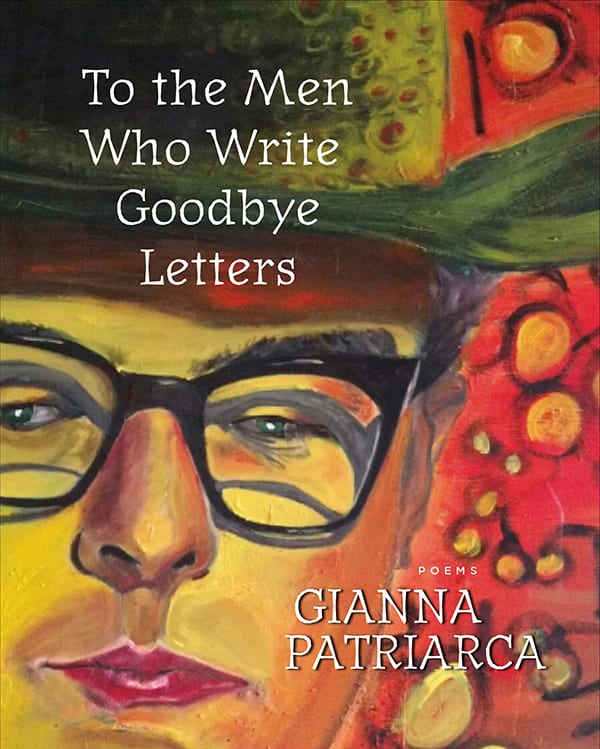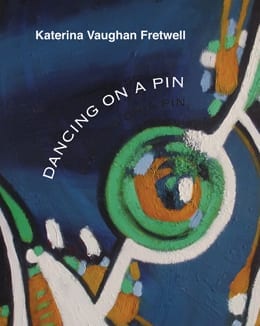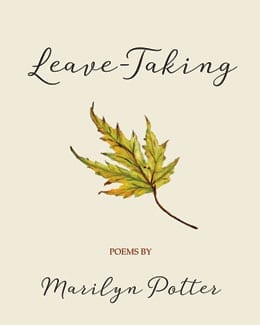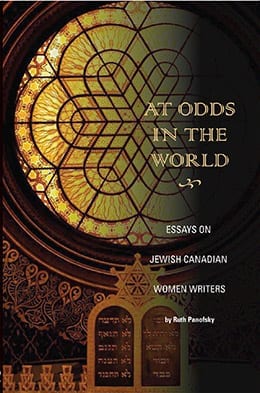The poems in The Men Who Write Good-bye Letters deal with death and our relationship with time, making sense of the choices made when we “end” things, or when things end without our permission, whether it be the end of a life, the end of a romance, or the result of an unexpected tragedy. These poems are a poet’s observation and reflection on the reasons for loss and endings, for survival and redemption, and an exploration of the poetry in the choices made. The collection also examines lives searching for clarity and value, ultimately leading to self-discovery and self-affirmation.
“To The Men Who Write Goodbye Letters is the work of an artist at the top of her game. In this elegantly crafted collection of poems, Patriarca has tapped into one of poetry’s most magical powers, its ability to sweeten the tragic and make it palatable to the human heart. Even when the poet sings of suicide and death, there is gentle comfort in the lyrical flow of the voice and its loving attention to the simple and ordinary details surrounding even the most sorrowful events.”
—Luciano Iacobelli, author of Book of Disorders and Dolor Midnight
“Gianna Patriarca’s reflective collection is a poetic reckoning in which missed opportunities,unspoken words, and ‘secrets and silences’ are confronted in ‘order to let go.’ In a sympathetic, incisive voice the poet faces a haunting of lovers, deceased family and friends and an immigrant community prosperous and dispersed. This percipient work is a taut redress to loss and promises not kept. A testament to the intimate burden of memory.”
—Joseph Sciorra, Calandra Institute, New York, author of Built With Faith: Italian American Imagination and Catholic Material Culture in New York City
“Gianna Patriarca has never been afraid to confront issues of powerless, silenced women marginalized by their conditions. With deceptively simple language this strong, rich collection of poems speaks to us with forceful emotion, one that readers will return to again and again.”
—Joseph Pivato, Athabasca University, editor of The Anthology of Italian-Canadian Writing
“Ai poeti resta da fare la poesia onesta,” Umberto Saba said once. In this collection, Gianna Patriarca turns the heavy soil of painful loss and asks us to join her in this difficult harvest. With humorous lifelines and tasteful metaphors still in place, these poems remind us to stay with our troubles and that it is okay not to be okay. Both triggering and cathartic, Patriarca’s words will leave you thankful for her never-failing blunt honesty.”
—Paolo Frasca, University of Toronto, Mississauga









Inanna Admin –
To the Men Who Write Goodbye Letters by Gianna Patriarca
reviewed by The Minerva Reader – December 2020
https://theminervareader.com/
Exquisite. Patriarca writes:
i could never have imagined
not being here
This collection is testament not only to a single life but to all our lives. Poignant, incisive and unforgettable in the best possible way, Patriarca captures the most pivotal moments of our hearts.
Inanna Admin –
A Review of To the Men Who Write Goodbye Letters by Gianna Patriarca
reviewed by Cristina Pietropaolo
Like so many, I think about the passage of time almost constantly of late: there was the before the pandemic and then there is now. In To the Men Who Write Goodbye Letters, Gianna Patriarca’s ninth published volume of poetry, she engages with the passage of time itself, from instances of childhood (“We Remain”), to the struggles of becoming an artist (“Real Fabrics,” “It Was the Wrong Time”), and what is supposed to happen (“They Tell Me”), this is a collection that at once inspires, amuses, and comforts.
This volume of 54 poems explores themes of death, longing, sorrow and grief. But there is so much life here, too. These poems exist out of time, on paper, and so the poet is simultaneously living in the past, present, and future, her words acting as illuminations around the edges of the poems, as scribes once illuminated manuscripts in medieval scriptoriums. Although Patriarca seems to be speaking to her generation — that is, the generation of my parents — the poems speak to me too, inducing memories of grandparents and great aunts, and so much more. Yes, nostalgia is at work in these poems, but, it is nostalgia in the true sense of the word, neither self-indulgent nor saccharine. This new work is a treasure to be savoured — if only for a few moments and Patriarca’s writing is incisive, aware and visceral.
Divided into three sections, the first poem of the first part, “Die So I can Write About It” compelled me to keep reading: “i don’t recall who wrote the line/some poet an important one/perhaps,” cueing what reads almost as a series of unsent letters to men who did not say goodbye; these poems reclaim those moments; the poet says goodbye instead, on her terms. “Parts of Her” follows, consisting of poems that are perhaps the most revealing — mediations on being a poet, a child, a daughter and a woman:
“as a young woman
you struggled to be heard
embraced invisibility
your name too foreign
too ethnic for the presses
the stories wouldn’t sell”
The last third, “Ten Days in January” is aptly titled, with elegies for the departed (“The Last Room,” “Her Style,” “Language”). Patriarca’s work is at once intimate and warm, revealing and blunt, while never failing to be incisive and eloquent, even at its most elemental. She’s also funny: “only fucked up romantics/write letters that become poems,” from the title poem had me chuckling wryly; I’ve had this moment, too.
Though not all readers will interpret the experiences recounted here as ones they can relate to, there is nonetheless a universal quality about many of the poems in this collection. They are the details of time passing, of lovers leaving, of the inevitability of death — these are the things that we can most count on, and it is Patriarca’s ability to capture the fine and subtle details of these experiences that render the ordinary extraordinary. This should not come as a surprise; in “Husband,” she writes,
“my husband needs
beautiful things around him
[ . . . . ]
the house we share is filled with impractical beauty
[. . . . ]
wrestling with my need
to celebrate the ordinary
that inspires me”
For me, this poem acts as the locus of the whole collection. The ordinary is exalted in Patriarca’s words, and perhaps this is the point: even the humblest lives and silent losses are worthy of being remembered, as captured by the denouement of “The Jump” or quietly celebrated in “Sometimes It
Gets Very Dark.”
The poems in this collection were written by a sure and thoughtful hand. In addition to the memories and friends and parents present in this work, philosophers, and literary figures are also invoked. In the funny and pointed poem “Posers” Patriarca writes,
“Friday night philosophers
Kafka Hegel Wittgenstein
[. . . .]
dissecting ideologies and
the meaning of art
somewhere beyond the full moon
Sylvia and Anne write poetry
nobody reads”
Throughout, Patriarca recognizes the burden of the poet — and women, too: the profound worry that no one will read their words. And yet, at the start of the book, after the epigraphs, but before the table of contents, is an extra page with two short columns of text, one in English, one in Italian, six lines each: the poet’s own blessing for the pages that follow, quoting her own work, her own self. I won’t spoil the surprise and simple pleasure of these lines; you’ll have to read them for yourself. This volume is the work of a poet who is utterly confident in herself and of her talents and skill.
I read this volume in one sitting over the holidays, and then I read it again. I’ve read it again since, and every time I do, the poems in this book quietly thrill me, and they also give me solace; they are an embrace I didn’t know I needed. Although these poems were written before the pandemic began, they are the perfect companion in these extraordinary circumstances. Read To the Men Who Write Goodbye Letters, and then read it again, too.
Cristina Pietropaolo is a writer, researcher and folklorist by training. She holds an MA from Memorial University of Newfoundland, and is currently working towards a Master of Information at the University of Toronto, specializing in book history and print culture.
Inanna Admin –
To the Men Who Write Goodbye Letters by Gianna Patriarca
Exploring the depths of Hope and Loneliness
reviewed by Angelo Sgabellone
Poetry as spirit continues to be an intellectual exercise that defies and is felt beyond a physical state, accordingly Aristotle stated: “there is nothing in the intellect that is not first gathered in the senses.”
Similarly William Everson suggested poetry is a formal confrontation that delineates aspects of “the self” which become shaped by ones creative instincts, thus a form of incontrovertible reasoning is forged by the creative mind into the poetic experience. Gianna Patriarca’s latest book: To the Men Who Write Goodbye Letters is a unique testament of creative transformation that is carved with imaginative words/images into emotional aspects of instinct rendered as natural soliloquies of hopeful optimism.
Gianna Patriarca was born in Ceprano, Italy; her family immigrated to Canada in l960. There she grew up in Toronto’s Little Italy, receiving a B.A. in English Literature/Italian and B.Ed. from York University, then worked as an elementary school teacher before becoming a poet. As a prolific writer she excelles as an ethnocentric talent focusing on Toronto’s arts/cultural community. She has published nine exceptional books of poetry; her readings are transformative and lyrical in timber and dialectical flow. Her poems have been anthologized and read on CBC, C.I.U.T., CHIN radios, TV Ontario, Imprint, C.F.M.T. TV and Telelatino. Gianna has been featured in international poetry events and lectures, at Yale and Calumet in the U.S., Udine and Milan in Italy. Her work has been included in Canadian and American university course work and is considered a “national treasure.”
Gianna’s recent book: To the Men Who Write Good-bye Letters by Inanna Press deals with death and loss. Its autobiographical and literary scope cases the distance between theme and effect and longing subjects who have affected her life. This edition took three years to complete, was inspired by her mother’s passing, and relationship with friends “who gave up on life”.
As a chronicler Gianna’s elegant voice delves heroically into pointed clarity as a form of re-affirmation of those that affected her by inexplicable levels of transitions. She draws from inner voices of experience, natural context, lost and referenced with a humanised sense of grace and affection for her subjects. Patriaca’s actually searches for clarity from silenced voices to take her into a form of lyrical affinity. Into a collective region of affection where words and imagery she inherited are internalized into subliminal symbolism. This sense of poetic projection becomes a gateway into the uncertainty of the human condition that draws us deeply from personal relationships to tradition and culture. Her artistic shaping also comes from Gianna’s unique sense of cathartic forms of sympathetic dialectical magic and natural orders of transitional redemption. This state of emotional/spiritual balance gives her work a liberating sense of enduring pretext and universal truths.
Gianna believes: she writes to “make sense” of loss, to give: “hope by bringing out a special celebration” of subjective purpose. For her, personal appreciation, for clarity of the dearly departed, and those who enriched her is fundamental to “goodbye notes [once] left with words and objects” in special places taken by elusive actions. Today such actions seem to suggest, Gianna’s timely memory is a literal testament of reflections where the promise of human endearment was more definitive once. Perhaps when grace shaped memory and reason seemingly into an enduring poetical expression or soothing investigations from a past fading soul. For her this subjectivity transcends into a hopeful empathy which she cased into lyricism as holistic shaping with the loss of her mother and close friends who touched her creative yearnings.
For most, an image of unusual beauty is often paralleled with expressive and moving rhythms of originality and elegance. Gianna Patriarca’s elegant verse and sensitive imagistic shaping imparts her topical metaphors like lost suitors, who couldn’t commit to an intimate substance. For me, her lyricism is a fluid witness of absence spent and essence shaped, from a time when human lament actually willed inner doubt, sent, then immortalized it with letters of transient voices as subsequent timelessness.
To the Men Who Write Good-bye Letters deals with the lyrical aspects of loss and longing. They give extension to sensibility that transcends into optimism. Gianna Patriarca’s eulogistic poetry acts as personal observations of time and space. Her subjectivity rests as a sacred alter of endearment, then towers for those courageous creatures she once loved. As Joseph Sciorra of New York’s Calandra Institute reminds, Patriarca’s work is: “A Testament of the intimate burden of memory.” As an ethno/moral voice she confronts diverse issues of powerlessness and marginalized Italo/Canadian sensbilities as an endearing legacy of ethereal “second comings” through poetic triumphs.